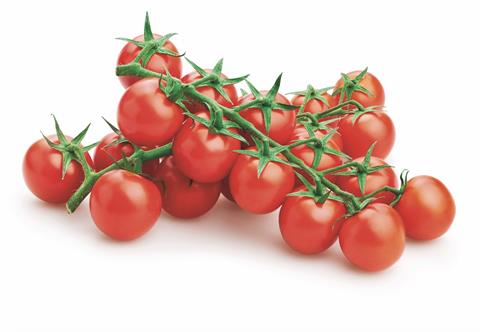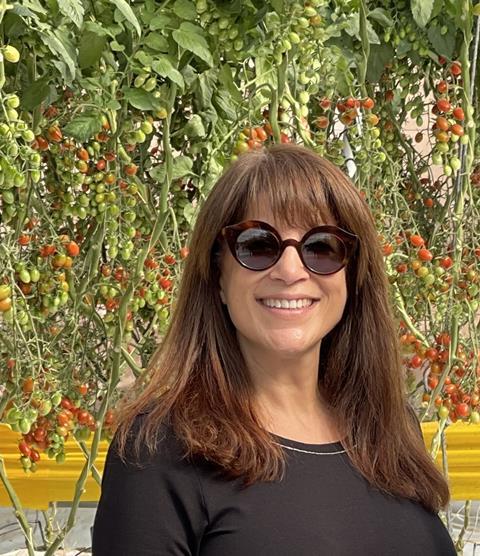Morocco’s tomato export industry has undergone significant developments during a season marked by both opportunities and challenges, according to Fatiha Charrat, deputy general director of Delassus

During the 2023/24 season, Moroccan producer-exporter Delassus saw its exports surpass 100,000 tonnes, sent to a total of 57 countries. With its range of snack tomatoes, citrus, grapes, avocados and flowers, Delassus continues to reinforce its position on the global market, says the company’s Fatiha Charrat.
What sort of growth are you seeing in the tomato category at Delassus?
Fatiha Charrat: Duroc, the Delassus subsidiary dedicated to tomatoes, aims to grow by 10 per cent compared with last season, targeting 75,000 tonnes of snack tomatoes in 2025. Duroc currently holds a 28 per cent market share in the UK and 31 per cent in the German market.
Moroccan tomato exports have experienced steady growth, reaching 690,000 tonnes in the 2023/24 season, with 58 per cent consisting of non-round tomatoes and marking a 19 per cent increase compared with the previous season. This performance has solidified Morocco’s position as the fifth largest tomato exporter globally.
Is the UK increasingly becoming a key market for Moroccan tomatoes?
FC: Morocco has outpaced Spain as the UK’s second largest tomato supplier for the third consecutive year. In 2024, Morocco exported 122,720 tonnes of tomatoes to the UK, with snack tomatoes accounting for 68 per cent of the total. This volume represents over 30 per cent of the UK’s total tomato imports. Morocco is diversifying its markets, serving 46 countries, with the UK accounting for 18 per cent of its tomato exports.

Initially, Moroccan tomatoes gained recognition due to their competitive pricing, but this is no longer the sole reason for their success. Moroccan tomatoes now excel in quality, with all surrounding conditions meticulously managed. The sector has rapidly grown in professionalism. Rather than simply sending its tomatoes to Perpignan, Morocco now supplies a significantly higher volume of packaged-at-source products year-round to markets such as the UK, Germany and other northern European countries.
Is production expanding? What’s the focus when it comes to varieties?
FC: Producers are increasing their cultivation areas, particularly in the Dakhla region, while also diversifying into other fruits, notably berries, to meet changing market demands. Although details on new tomato varieties are limited, the focus remains on varieties resistant to ToBRFV and improving quality and yield to maintain Morocco’s competitive advantage. The Tomato Brown Rugose Fruit Virus (ToBRFV) has impacted Moroccan tomato production, causing estimated losses of 15-20 per cent in 2023/24.
What are the main challenges at the moment? Are labour costs rising in Morocco?
FC: As of April 2024, the Moroccan government, employers and unions reached a new social agreement that includes a 10 per cent increase in the Minimum Agricultural Guaranteed Salary (SMAG). The increase will be implemented in two phases: a 5 per cent raise effective 1 April 2025, raising the daily wage to around 93 MAD per day, which amounts to approximately 2,255 MAD per month. Another 5 per cent raise is planned for 1 April 2026, further improving agricultural workers’ earnings. These adjustments aim to gradually align the SMAG with the Minimum Interprofessional Guaranteed Salary (SMIG), which applies to industrial, commercial and service sectors.
In addition to complying with the Minimum Agricultural Guaranteed Salary (SMAG), leading producers like Duroc go above and beyond by offering a range of benefits that significantly improve the quality of life for their workers. These include performance bonuses to incentivise and reward productivity, as well as free transportation to facilitate commuting, especially for workers from remote areas. Employees also benefit from on-site canteens, ensuring access to nutritious meals, and medical care services that provide essential healthcare. Moreover, Duroc invests in the future of its workers by offering academic support programmes for their children, helping them excel in their studies.
What about climate change? Are growers concerned about the impact?
FC: Climate change presents serious challenges for Moroccan tomato production, with projections indicating potential yield reductions due to rising temperatures and increasing water scarcity. Morocco has already endured seven consecutive years of drought, which would have severely impacted production in the Agadir region if the government had not made significant investments in seawater desalination. Today, approximately 40 per cent of the region’s water needs are met by the Souss desalination plant, which plays a crucial role in sustaining agricultural activity. However, desalinated water costs three times more than well water, adding a significant financial burden for growers.



